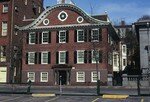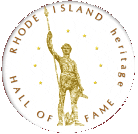Inductee Details
< Back
Joseph Brown
(1733-1785) ~ Inducted 1999Brown, Joseph, 1733-1785
Joseph Brown was a noted businessman, scientist, and architect, was the son of James Brown and Hope Power and one of the famous Brown brothers who dominated civic life in Providence during the second half of the 18th century. Although he was a successful merchant, his heart and mind were also occupied by more learned enterprises. Brown is best known for his role in making observations of the transit of the planet Venus across the suns face in 1769, a project in which he collaborated with other astronomers around the world. By comparing transit measurements made at different sites, scientists were able to determine the parallax of the sun and from this, the dimensions of the solar system. Aside from astronomy, Brown was interested in chemistry, electricity, meteorology, and architecture. In 1772, he supervised the assembly of a new fire engine for Providence, and in 1780 he constructed an improved steam engine to pump water out of the iron ore mines that supplied the family-owned Hope Furnace in Cranston. In 1775, Brown helped to erect a high beacon to warn the greater Providence area of the approach of British vessels, and he supervised the casting and boring of Revolutionary War cannon at the Hope Furnace. In 1781, Brown served in the General Assembly as a delegate from Providence. Between 1770 and 1785, the versatile Brown designed several of Providences most notable buildings including University Hall ("the College Ediface"), the First Baptist Meeting House, the Market House, his own mansion at 50 South Main Street, and his brother Johns house on Power Street ("the John Brown House"). The latter structure was described by John Quincy Adams as the "most magnificent and elegant mansion in America." Brown, a trustee of Rhode Island College (soon to bear his familys name), taught students there and conducted experiments for them. In 1784, when the college struggled to resume activities after the war, he volunteered to serve as professor of experimental philosophy without pay. Death cut short his academic career in 1785. Before his death, however, he was elected a member of the American Academy of Arts and Sciences in recognition of his work and achievements.
Photo of Joseph Brown House by Chet Smolski, Rhode Island College. RIC Digital Commons
See more inductees in:
- Education & Universities
- Technology & Science
< Go back
Browse through our collection of 750+ amazing Rhode Islanders:
Search by Name or Keyword:
Area of Accomplishment:
African Americans | Agriculture / Farming | Architects & Designers | Artists & Painters | Banking / Finance | Business / Entrepreneurs | Civic Leaders | Civil Engineer | Civil Rights / Abolitionists | Clergy | Craftsmen | Dance | Econonomics / Theory | Education & Universities | Entertainment Development | Explorers & Adventurers | Famous RI Families | Food / Culinary | Founders of Rhode Island | Government & Politics | Historians/Historical Accounts, Preservation | Immigrants: Chinese | Immigrants: Irish | Immigrants: Portuguese | Industry - General | Industry - Jewelry | Industry - Maritime | Industry - Textiles | Inventors & Inventions | Labor / Unions | Law / Legal Pioneers | Literature / Writers / Newspapers | Medicine & Health Care | Military | Music (Singers, Composers) | Native Americans | Olympic Athletes | Philanthropists | Religion & Churches | Retail Pioneers | Rogues | Sports - Baseball | Sports - Basketball | Sports - Football | Sports - Golf | Sports - Hockey | Sports - Other | Sports - Tennis | Sports - Track and Field | Technology & Science | Theater | TV & Radio | Women |
